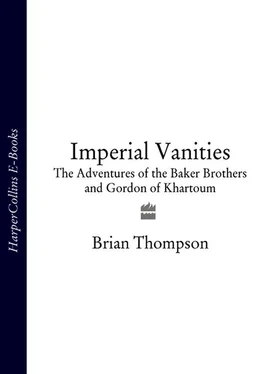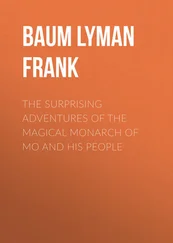The Adventures
of the Baker Brothers and
Gordon of Khartoum
BRIAN THOMPSON

To Elizabeth
Cover
Title Page
Dedication
List of Maps
Preface
Prologue
ONE
TWO
THREE
FOUR
FIVE
SIX
SEVEN
EIGHT
NINE
TEN
ELEVEN
TWELVE
Keep Reading
Index
Other Works
List of Illustrations in Text
Books Consulted
Copyright
About the Publisher
Old Map of Ceylon from Skinner, T., Fifty Years in Ceylon , 1891.
Map of Zambesi with annotations by Livingstone © AKG London.
Nile map from Elton, Fifty Years in Ceylon , 1954.
Livingstone’s real map of watershed from Jeal, T. Livingstone , 1973.
This book is the interweaving of three remarkably self-willed lives. The careers of the two Baker brothers and Charles Gordon crossed and recrossed, very seldom in England itself, more usually at the eastern end of the Mediterranean (on occasions even further afield) coming at last to a tragic denouement in Egypt and the Sudan. They were Victorians with a taste for the heroic who made their friends and enemies from among the same restless kind. So, in these pages, we find also the enigmatic traveller, Laurence Oliphant; the explorers James Hanning Speke and Richard Francis Burton; the missionary David Livingstone; and soldiers as wildly unlike as Major-General Sir Garnet Wolseley and the irrepressible Captain Fred Burnaby.
There is a common connection, in that all these men were servants of Empire. Even Burton, such an inventively bitter critic of his own country and enemy to most of what we usually label Victorianism, put on his KCMG decoration for the first and last time in June, 1887, and celebrated Victoria’s Golden Jubilee in the grounds of the consulate in Trieste with these ringing words: ‘May God’s choicest blessings crown her good works!’
That particular weekend, toasts like this were uttered in every British embassy and consulate across the globe, as well as all the Queen’s dominions. As the sick and world-weary Burton himself put it, in a sudden and late flowering of imperial sentiment ‘May the loving confidence between her Majesty and all English-speaking-peoples, throughout the world, ever strengthen and endure to all time.’
The God that was invoked was held without question to be an Englishman. God the Englishman had subjugated half the world, bringing the blessings of civilization to heathens considered in desperate need of it. This is the background theme to much of what you are about to read. There could hardly be a greater vanity. Joseph Conrad was enough of a genius to look into its psychological first cause:
‘It is better for mankind to be impressionable than reflective. Nothing humanely great-great, I mean, as affecting a whole mass of lives – has come from reflection. On the other hand you cannot fail to see the power of mere words: such words as Glory, for instance, or Pity … Shouted with perseverance, with ardour, with conviction, these two by their sound alone have set whole nations in motion and upheaved the dry, hard ground on which rests our whole social fabric. There’s “virtue” for you if you like!’
These words, which were written to preface Conrad’s own experimental autobiography, A Personal Record , published in 1908, put the case admirably for the present book. Under only slightly different circumstances, a different throw of the dice, he might have applied them to the revolutionary politics of his father, Appollonius Korzeniowski. But in 1886, Conrad became a naturalised British citizen and at the time of the Jubilee and all its imperial celebration he was sailing about the Malay Archipelago, his eyes wide open to what brought white men to the ends of the earth – and kept them there.
My main intention has been to tease out the connections between three men, their lives and times. But there is also a desire to replicate what was itself a minor Victorian addition to the art of the book, one that has given pleasure right down to the present day.
As the story opens out, little by little a seemingly solid picture arises, in which elements that have no clear immediate purpose bend and unfold until, when the covers are finally laid flat, a man in uniform stands at the steps to a Governor’s palace. One hand is drawn across his chest in a gesture of fidelity to God and in the other a revolver dangles. Many intricate pleats and folds of coloured paper have brought him to life. By the strange compulsion we have to know about these things, the moment that is illustrated is also the moment of his death.
Nothing can make the little cardboard figure turn away, any more than the rush of all those turbanned men can be halted. The death of General Gordon had, for Victorians, all the elements of terror and pity evoked for us in a later age by the assassination of John F. Kennedy. Among Gordon’s contemporaries, for months, then years, the flux of history seemed, as it were, to shudder in its course. And then, inevitably, the story dwindled, along with the vanities that brought it into being. The two Baker brothers and Charles Gordon, who they were to each other and what constituted their life achievements, the joy they had of the world and its sorrows, fell like stones into the waters of the Nile.
I should like to thank Yvonne and Anthony Hands for many hours of genial encouragement in the writing of this book; John Crouch and Thomas Howard for some helpful pieces of research; an exemplary literary agent, David Miller, and not least Arabella Pike, an editor whose zestful enthusiasm for a good human interest story never sleeps. Finally, the work is dedicated, not without an element of apprehension, to a writer I have greatly admired for more than thirty years, whose good opinion is always worth having.
In 1815 a specially severe hurricane hit the island of Jamaica, tearing hundreds of houses and shanties from their foundations and dumping them in the sea. Over a thousand people were drowned or simply disappeared from the face of the earth. When the news was carried back to England, the only anxiety raised was what consequences there might be for the sugar plantations, for the Bristol and Liverpool merchants who controlled the trade realised at once that the victims of the hurricane were for the most part black. Jamaica was a slave island – the most ruthless and successful of them all – and the death of so many people was counted simply as additional loss of property. There was a verb much used whenever disaster of this magnitude occurred among the black population: the agents of the great plantations talked calmly about the need to ‘restock’.
To be British in Jamaica at that time was to live at the edge of things, almost but not quite beyond the reach of Europe’s civilising virtues. Whatever law that was enacted at Westminster touching the island’s affairs arrived in the Caribbean like ship’s biscuit, in a weevilly condition. For example, when it was seen that Parliament intended, after unrelenting effort by William Wilberforce and his parliamentary supporters, to bring about the abolition of slavery, one response of the planters was to encourage their women slaves to marry and end the common practice of abortion. They were looking ahead. If they could not at some time in the future import slaves, they would need to factory farm them on site.
Читать дальше













